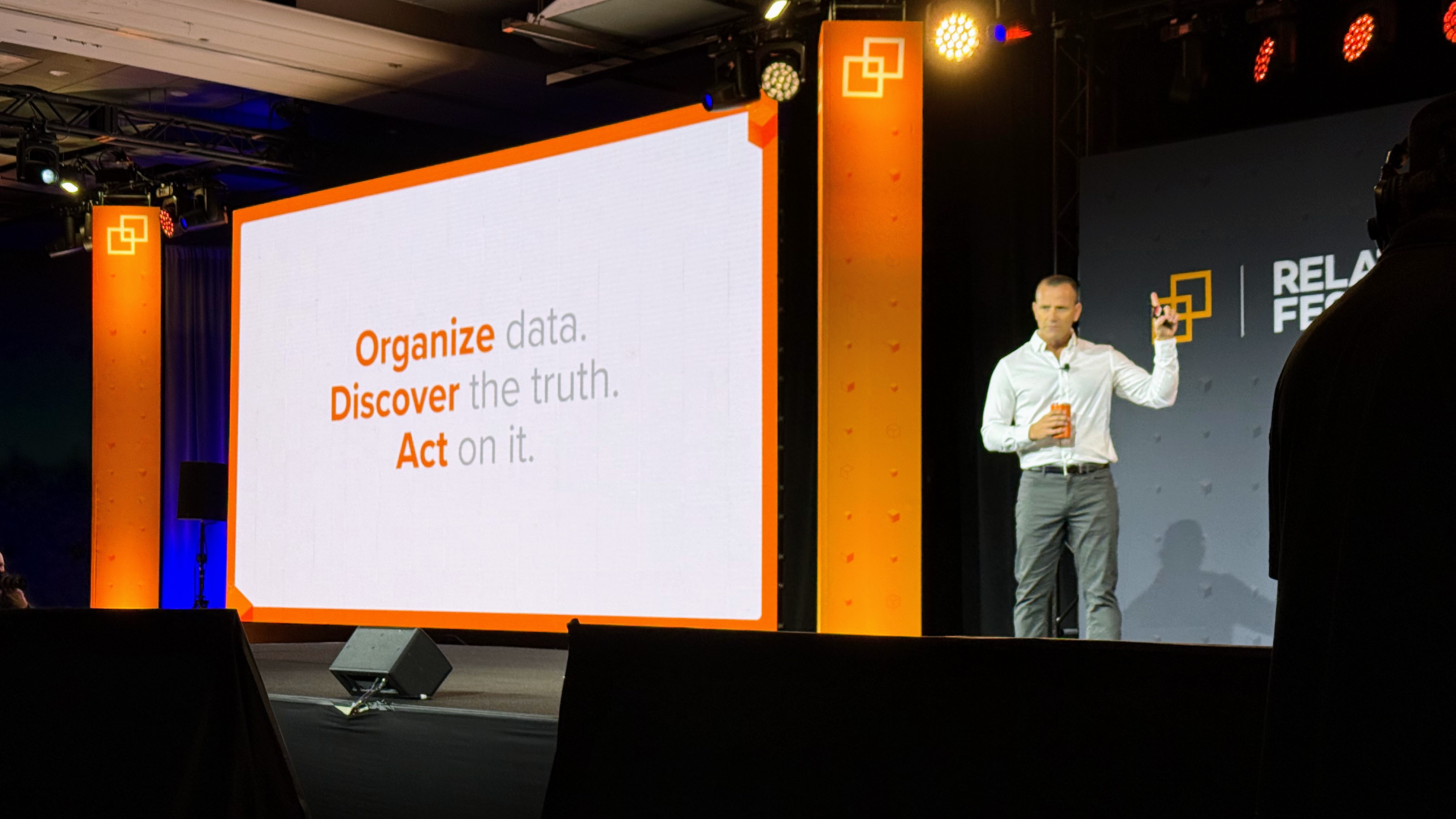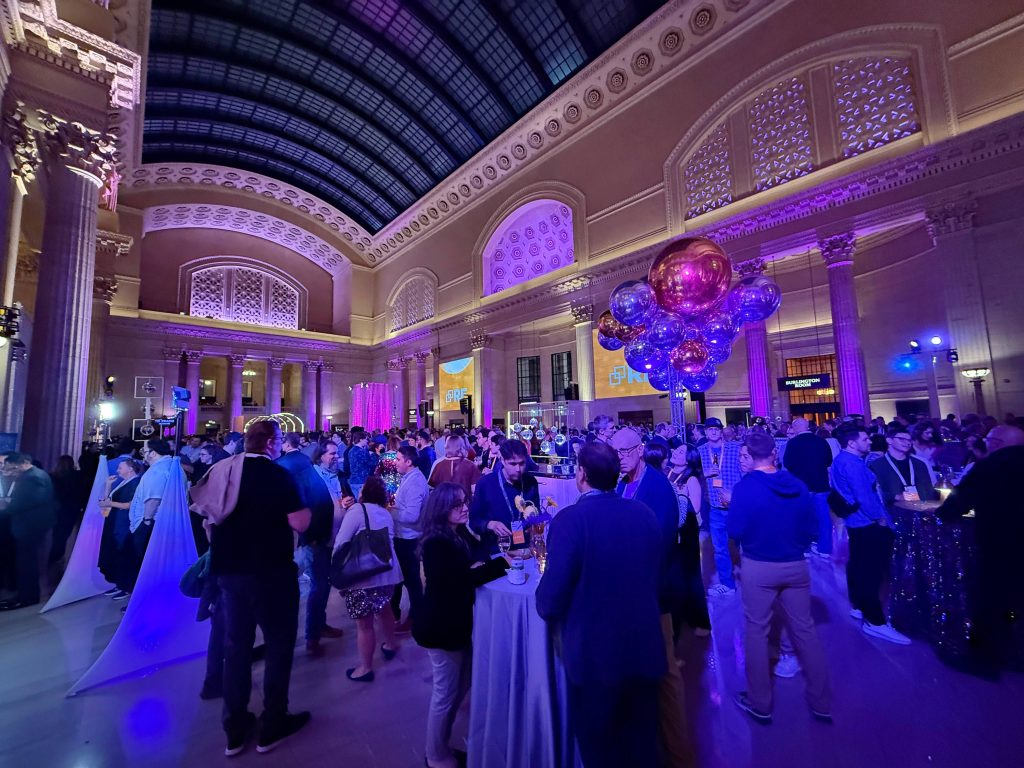In a keynote that was equal parts rallying cry and strategic roadmap, Relativity CEO Phil Saunders stood before 1,834 attendees at Relativity Fest 2025 in Chicago last week and delivered an unconventional message for a technology leader: what his company has built “is not enough.”
The refrain became a through-line in Saunders’ remarks at the annual gathering held Oct. 7-9 at the Hyatt Regency Chicago, encapsulating both the company’s self-critique and its vision for the future of legal technology.
Rather than resting on the laurels of having built a dominant e-discovery platform over 24 years, Saunders challenged both his company and the legal industry to embrace discomfort as the path forward.
“If we’re not willing to disrupt our core business today, someone else will do it,” Saunders said. “It’s undeniably true in the world we live in. And so we have to get comfortable being super uncomfortable with that fact.”
A Personal Mission
Saunders framed the moment as deeply personal, describing how he struggled to find his authentic voice while preparing for the keynote. The breakthrough came at 2 a.m., he said, when he crystallized what binds Relativity’s community together. It is, he said, “a loyalty to a common purpose” combined with the human traits of “curiosity, fearlessness and boldness.”
“You can’t build tech around that. That’s completely human,” Saunders told the crowd, which included 604 first-time Relativity Fest attendees alongside veterans, some of whom were attending for their 13th or 14th time.
This approach informs the company’s product philosophy, Saunders said. While acknowledging the allure of discussing “transformation” and “native AI tools,” he emphasized that customers also need Relativity to “continue to evolve the Beast” – the core platform that added 133 new capabilities and resolved 764 incidents in the past year alone.
“The transformation side, that’s cool,” Saunders said. “We get to build cool new things and rally with it. But if we’re not willing to disrupt our core … someone else will do it.”
Three Major Announcements
Against the backdrop of this product philosophy, Relativity made three significant announcements, all related to accelerating the company’s transformation.
- Integrating Generative AI into Core Platform
In the keynote’s most significant announcement, Saunders revealed that Relativity aiR for Review and aiR for Privilege – currently optional paid capabilities – will be integrated into the core RelativityOne subscription at no additional cost. The move aims to “democratize AI and aiR, make it accessible to everyone that’s on the platform, and remove any hurdle.”
The decision comes amid significant growth for the generative AI suite, the company said. In just 20 months since launch, more than 200 customers have used aiR solutions to review over 25 million documents across thousands of matters, with the platform capable of analyzing up to 3 million documents per day. Customers have made more than 100 million review decisions using aiR, with adoption averaging millions of decisions weekly in recent months.
Chris Brown, chief product officer, emphasized the transformative impact: “aiR is growing exponentially. We literally watch it every week, and we’re like, man, it continues to grow.”
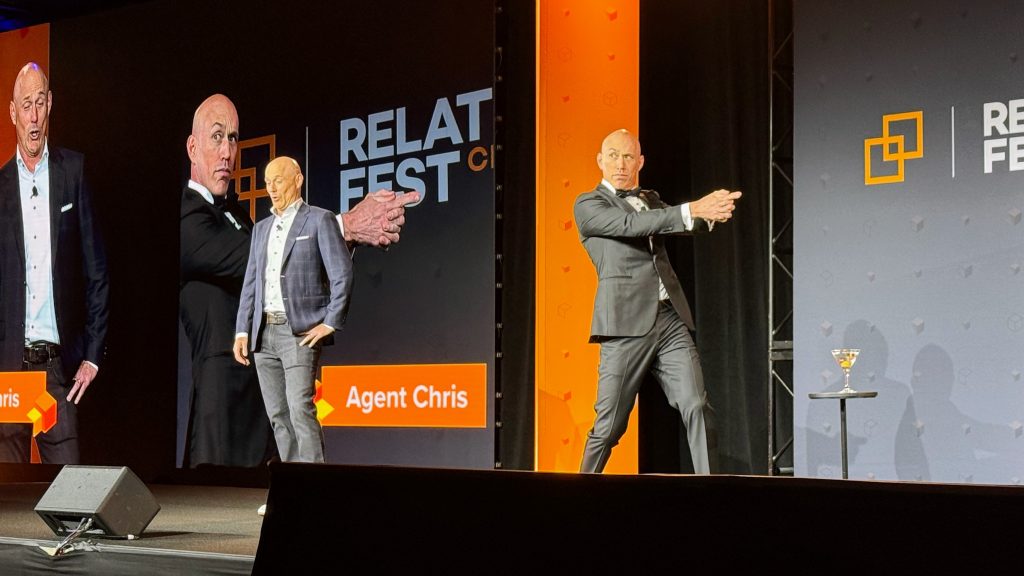
Building on a comedy bit they introduced at least year’s Fest, CTO Chris Brown’s twin brother Eric Brown played AI agent Chris.
Relativity provided customer testimonials that highlighted their results using aiR. Purpose Legal completed a 300,000-document review in just one week using aiR for Review, reducing review time by 85% and delivering more than $70,000 in cost savings. Other customers reported cutting review time by as much as 80% while surfacing thousands of privileged documents that would have been missed.
Also slated for standard integration is aiR Assist, scheduled for early 2026, which uses natural language search to dramatically reduce time to insight – potentially cutting discovery timelines from weeks to minutes.
- Moving AI ‘To the Left’
Committing to what he described as “a step function change in how early case assessment is done,” Saunders announced the launch of aiR Assist to apply gen AI earlier in the discovery process. The new tool will help teams move from triaging data to informing case strategy by unpacking, identifying and summarizing documents, converting massive datasets into clear storylines, and triangulating people, personas, departments and issues, he said.
“We’re moving it to the left,” Saunders said, referring to the Electronic Discovery Reference Model. “This product is going to help you move from triaging data to using that data to inform your effective strategy on your case, your matter, your issue.”
The vision extends beyond simple search to create a “research partner” that builds structured knowledge foundations, identifies gaps in collections, and surfaces cross-cutting themes that might otherwise remain hidden.
- Launching Rel Labs Investment Arm
Perhaps most ambitiously, Relativity announced Rel Labs, an investment arm and innovation hub designed to extend the company’s reach across the legal tech ecosystem. Saunders said he secured board funding to create a micro-fund in partnership with the Legal Tech Fund, the largest venture capital firm dedicated to legal AI startups.
“If we did everything right, if Relativity did everything perfect, if aiR was perfect, if our 869 engineers were doubled to some other number, if we doubled our spend in R&D, it still wouldn’t be enough,” Saunders said. “Because there’s just too much darn advancement and transformation in legal tech going on that you just can’t ignore.”
Rel Labs will look to identify, invest in and help develop the “coolest, most advanced tech” out there, Saunders aid, whether they are adjacent to what Relativity does or directly competitive. “They may just do it better, so why would we not acknowledge that?”
Getting Shit Done
Throughout the keynote, a series of speakers who lead Relativity’s product development emphasized RelativityOne’s evolution from a “system of record” to a “system of action” where decisions are made and workflows orchestrated. Saunders joked that he wanted to call it “GSD” (Get Shit Done) rather than the more professional “system of action.”
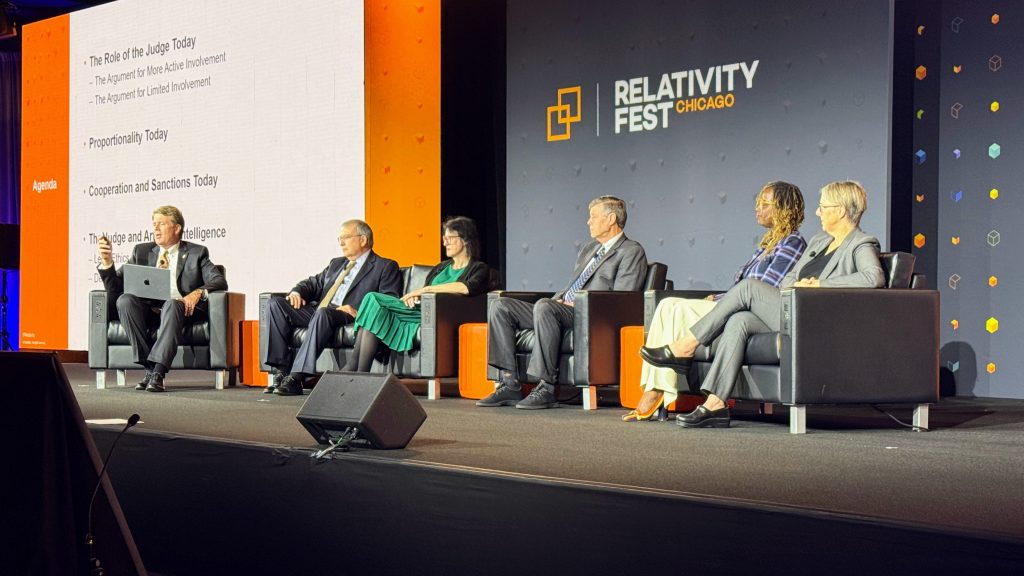
An annual highlight of Relativity Fest is the judge’s panel moderated by David Horrigan. This year’s panel featured (from left) Horrigan; U.S. District Judge Xavier Rodriguez, W.D. Texas; Dr. Victoria McCloud, former judge, High Court of Justice, U.K.; U.S. Chief Magistrate Judge William Matthewman, S.D. Fla.; Justice Tanya R. Kennedy, associate justice, appellate division, First Department, New York; and U.S. Magistrate Judge Allison Goddard, S.D. Calif.
The platform now supports over 300,000 active workspaces globally, ranging from small matters with fewer than 5,000 documents to massive cases with millions of documents. Use cases have expanded well beyond traditional litigation to include internal investigations, regulatory requests, contract review, cyber breach response, FOIA requests, and more.
Brown presented data showing that while litigation remains dominant, corporate users dedicate significantly more workspace to internal investigations, and public sector organizations are seeing rising volumes of FOIA and public records requests. Each slice represents “an opportunity for growth,” he noted, with R&D teams already working to bring generative AI into the FOIA process.
Co-innovating with Customers
Brown, alluding to what he described as a Silicon Valley buzz phrase of “forward-deployed engineering – where product managers and engineers co-innovate with customers – said that has been Relativity’s approach for decades. He showed images of Relativity employees meeting with customers globally, working at whiteboards to solve challenges together.
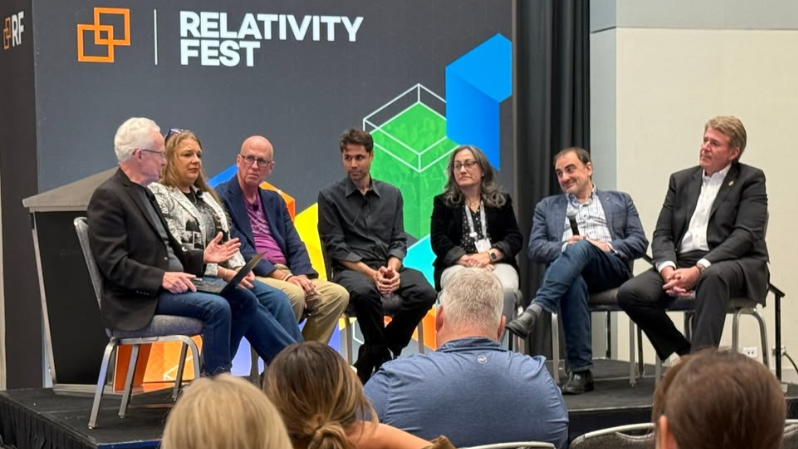
We took our Legaltech Week show on the road for a live episode at Fest. I was joined by Stephanie Wilkins, director of content, Legaltech Hub: Steve Embry, publisher, TechLaw Crossroads; Rhys Dipshan, editor-in-chief of legal technology at ALM; Nicole Black, legal tech columnist and principal insight strategist at 8am; Joe Patrice, editor, Above the Law; and David Horrigan, discovery counsel and legal education director at Relativity.
“We’ve been doing forward deployed engineering at Relativity for literally decades,” Brown said, noting that almost all of the year’s 130+ major features involved customer participation in advanced access programs.
This collaborative spirit was embodied by the Legal Data Intelligence summit held during Relativity Fest, Brown said, reflecting a community that “doesn’t just bring our brains, although we’re very smart, we bring our hearts.”
Five Years of Justice for Change
In a separate announcement, Relativity celebrated the five-year milestone of its Justice for Change program, which provides free access to RelativityOne for organizations advancing social justice. Since launching in 2020, the program has supported more than 250 matters globally, with over 16.2 million documents in Justice for Change workspaces and over 90 participating organizations.
The program has enabled impactful outcomes in cases ranging from wrongful convictions to environmental protection and civil rights litigation. Success stories include the Innocence Project winning a client’s exoneration after 23 years of wrongful incarceration, and the National Health Law Program helping medically fragile children access necessary nursing services.
“Relativity was early in recognizing that AI and advanced legal tech solutions could, and should, be used for good,” said Saunders. “As we look ahead, we remain committed to leading the way, sustaining this momentum, and empowering our communities to drive meaningful change.”
The program has expanded from North America to Australia, New Zealand, Canada and the EMEA region, and now includes access to Relativity’s gen AI suite, including Relativity aiR.
Innovation Awards Announced
Relativity also announced winners of its 2025 Innovation Awards, which were reconfigured this year with new categories and themes to better reflect evolving community needs. The awards fell into two themes: Best Innovator (honoring individuals) and Best Innovation (recognizing organizations solving complex challenges).
The winners were:
Best Innovator Categories
- Access to Justice: Melissa Weberman, Counsel and Head of eDiscovery & Data Analytics Group, Arnold & Porter Kaye Scholer LLP.
- Customer Experience: Daniel Smith, eDiscovery Consultant, A&O Shearman.
- Legal Education: Andrew Pardieck, Professor, Southern Illinois University Simmons Law School.
- Inclusion: Nicole Allen, E-Discovery of Counsel, Kilpatrick Townsend & Stockton LLP.
- Stellar Women: Sarah Cole, Director of Client Engagements, Cimplifi.
Best Innovation Categories
- Beyond: CDS Vision Financial Analysis, CDS.
- Organize: eMerge Split!, Troutman Pepper Locke eMerge.
- Discover: HSF Kramer Snap, Herbert Smith Freehills Kramer.
- Act: Allens Chronology Plus, Allens.
- Workflow: Hatch Waxman Pipeline Protection & Redaction Workflow, IntrepidX.
Missionaries, Not Mercenaries
As Saunders wrapped his keynote, he invoked venture capitalist John Doerr’s distinction between two types of companies: mercenaries, focused on quarterly results and short-term wins, versus missionaries, committed to long-term vision and community.
“Missionaries are in it for the long, they’re in it for the community, they’re in it for the customer,” Saunders said. “So I just want to wrap by saying thank you. Thank you for being on this mission with us. It’s really personal and we couldn’t be where we are without you.”
Throughout his remarks, Saunders kept coming back to that theme of “It’s not enough.” He is absolutely right. Given the wave of innovation overtaking the legal tech industry, excellence today may merely be tomorrow’s baseline.
 Robert Ambrogi Blog
Robert Ambrogi Blog